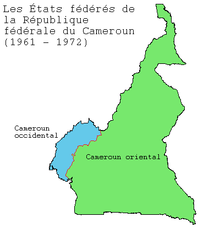| West CameroonCameroun occidental | |||||||||||
|---|---|---|---|---|---|---|---|---|---|---|---|
| State of the Federal Republic of Cameroon | |||||||||||
| 1961–1972 | |||||||||||
 West Cameroon (blue) within the Federal Republic of Cameroon | |||||||||||
| Capital | Buea | ||||||||||
| Area | |||||||||||
| • | 42,710 km (16,490 sq mi) | ||||||||||
| • Type | Federated state | ||||||||||
| History | |||||||||||
| • Established | 1 October 1961 | ||||||||||
| • Disestablished | 2 June 1972 | ||||||||||
| |||||||||||
| Today part of | Cameroon | ||||||||||
West Cameroon (French: Cameroun occidental) was a federated state within the Federal Republic of Cameroon that existed between 1961 and 1972. It was formed on 1 October 1961 when the formerly British-administered Southern Cameroons was integrated into the Republic of Cameroon to form the Federal Republic of Cameroon and abolished on 2 June 1972 when Cameroon became a unitary state. The region now falls within the Northwest Region and Southwest region of Cameroon.
History
See also: History of CameroonThe German Empire established the Kamerun protectorate in August 1884. At the conclusion of the First World War, the Treaty of Versailles divided German Kamerun between France and the United Kingdom, with what would become West Cameroon becoming the southern region of British administered Cameroon.
As part of the process of decolonization, voters were asked in a referendum held in 1961 whether they wished to join either Nigeria or Cameroon. With a majority opting to join Cameroon, the British administered Southern Cameroons were integrated into the Republic of Cameroon, which had gained independence from France in the previous year, to form the Federal Republic of Cameroon. West Cameroon was to enjoy autonomy within the federation, with its own legislature and regional government.
Following a referendum held on 20 May 1972, a new constitution came to effect on 2 June 1972, which reconstituted Cameroon as a unitary state. West Cameroon was abolished and replaced by two regions, the Northwest Region and Southwest region.
A nationalist movement, which seeks to establish an independent state, to be known as Ambazonia, exists in the region resulting in an armed conflict breaking out in 2017.
Governance
The constitution of West Cameroon gave the region its own legislature, regional government led by a prime minister, civil service and police force. The federal constitution gave the institutions of West Cameroon executive and legislative competence in all areas not specifically reserved for the federal government.
Executive
Executive authority was vested in an Executive Council (cabinet) consisting of between 7 and 11 Ministers led by a Prime Minister.
- Prime Ministers
| No. | Portrait | Name (Birth–Death) |
Election | Term of office | Political party | President | ||
|---|---|---|---|---|---|---|---|---|
| Took office | Left office | Time in office | ||||||
| Prime Minister of West Cameroon | ||||||||
| 1 | 
|
John Ngu Foncha (1916–1999) |
1961 1964 |
1 October 1961 | 13 May 1965 | 3 years, 224 days | KNDP | Ahmadou Ahidjo |
| 2 | 
|
Augustine Ngom Jua (1929–1977) |
— | 13 May 1965 | 1 September 1966 | 2 years, 243 days | KNDP | |
| (2) | 1 September 1966 | 11 January 1968 | UNC | |||||
| 3 | 
|
Salomon Tandeng Muna (1912–2002) |
1970 | 11 January 1968 | 2 June 1972 | 4 years, 143 days | UNC | |
- Cabinets
Legislative
The legislature of West Cameroon was bicameral, consisting of a 37-member House of Assembly as the lower chamber and a House of Chiefs as the upper chamber.
- Speakers of the House of Assembly
| Name | Entered office | Left office |
|---|---|---|
| Paul Kale | January 10, 1962 | August 1966 |
| Willie Ndep Orock Effiom | 1968 | 1972 |
See also
References
- Diduk, Susan (1993). "European Alcohol, History, and the State in Cameroon". African Studies Review. 36 (1): 1–42. doi:10.2307/525506. ISSN 0002-0206. JSTOR 525506. S2CID 144978622.
- Nyamnjoh, Francis (2003). Negotiating an Anglophone Identity. Leiden, the Netherlands: Brill. p. 15. ISBN 9004132953.
- Dieter Nohlen, Michael Krennerich, & Bernhard Thibaut (1999) Elections in Africa: A data handbook, p. 177 ISBN 0-19-829645-2
- ""Cameroon Military Executing, Abusing" - HRW". Voice of America. Agence France-Presse. 11 August 2022. Retrieved 22 March 2023.
In 2017, resentment at perceived discrimination snowballed into the declaration of an independent state -- the 'Federal Republic of Ambazonia,' an entity that is not recognised internationally.
- ^ DeLancey and DeLancey 84.
- https://condor.depaul.edu/mdelance/images/Pdfs/West%20Cameroon%20Constitution.pdf
- "Index E" (PDF). www.jstor.org. JSTOR 45193813.
- Pierre Kamé 2018, p. 51 harvnb error: no target: CITEREFPierre_Kamé2018 (help)
Sources
- DeLancey, Mark W., and Mark Dike DeLancey (2000): Historical Dictionary of the Republic of Cameroon (3rd ed.). Lanham, Maryland: The Scarecrow Press.

